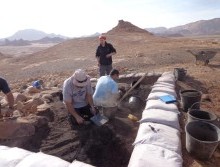
Excavation of metallurgical workshop in Timna. Photo Courtesy of Central Timna Valley Project – Tel Aviv University
Ever wondered what clothes were worn by the “software engineers” of the ancient Middle East? A group of archaeologists, aided by the unique environment of mines in the Israeli desert, have discovered fabrics that shed light on one of the groups of ancient specialists—copper smelters. A team from Tel Aviv University discovered the extremely rare garments—believed to be 3,000 years old and date from the era of King David and King Solomon—in the Timna copper mines.
Excavation team lead Dr. Erez Ben-Yosef, according to a press release published by the Israeli Government Press Office, was quoted as saying the discovery is special even for a region with so many ancient historical sites. “No textiles have ever been found at excavation sites like Jerusalem, Megiddo and Hazor, so this provides a unique window into an entire aspect of life from which we’ve never had physical evidence before,” Dr. Ben-Yosef said. The fabrics, which include clothes, rope, bags, and tents, are of a “very high quality” according to Dr. Ben-Yosef, likely due to the class of copper smelters who possessed what was then a sophisticated and specialized skill.
“The possession of copper was a source of great power, much as oil is today,” Dr. Ben-Yosef said. “If a person had the exceptional knowledge to ‘create copper,’ he was considered well-versed in an extremely sophisticated technology. He would have been considered magical or supernatural, and his social status would have reflected this.”
The press release compared the mines to an ancient “silicon valley”—the American region famous for computer technology. Dr. Ben-Yosef said the copper smelters would have been “highly respected craftsman,” and their “luxury-grade fabric” reflected their status.
The find also sheds light on an ancient Biblical people group believed to have worked the mines—the Edomites. “The wide variety of fabrics also provides new and important information about the Edomites, who, according to the Bible, warred with the Kingdom of Israel,” said Dr. Ben-Yosef. “We found simply woven, elaborately decorated fabrics worn by the upper echelon of their stratified society.”
The types of fabrics included linen, which would have had to have been shipped to the Israeli desert from the Jordan Valley or even farther north. TAU masters student Vanessa Workman was quoted in the press release as saying this helps highlight the sophistication of the ancient trade networks as well.
Among the discoveries were more than just fabrics. Also found were thousands of ancient seeds from the “seven species”—the grains and fruit closely associated with the Land of Israel.
“This is the first time seeds from this period have been found uncharred and in such large quantities,” said Dr. Ben-Yosef. “With the advancement of modern science, we now enjoy research options that were unthinkable a few decades ago. We can reconstruct wine typical of King David’s era, for example, and understand the cultivation and domestication processes that have been preserved in the DNA of the seed.”
(By Joshua Spurlock, www.themideastupdate.com, February 24, 2016)
